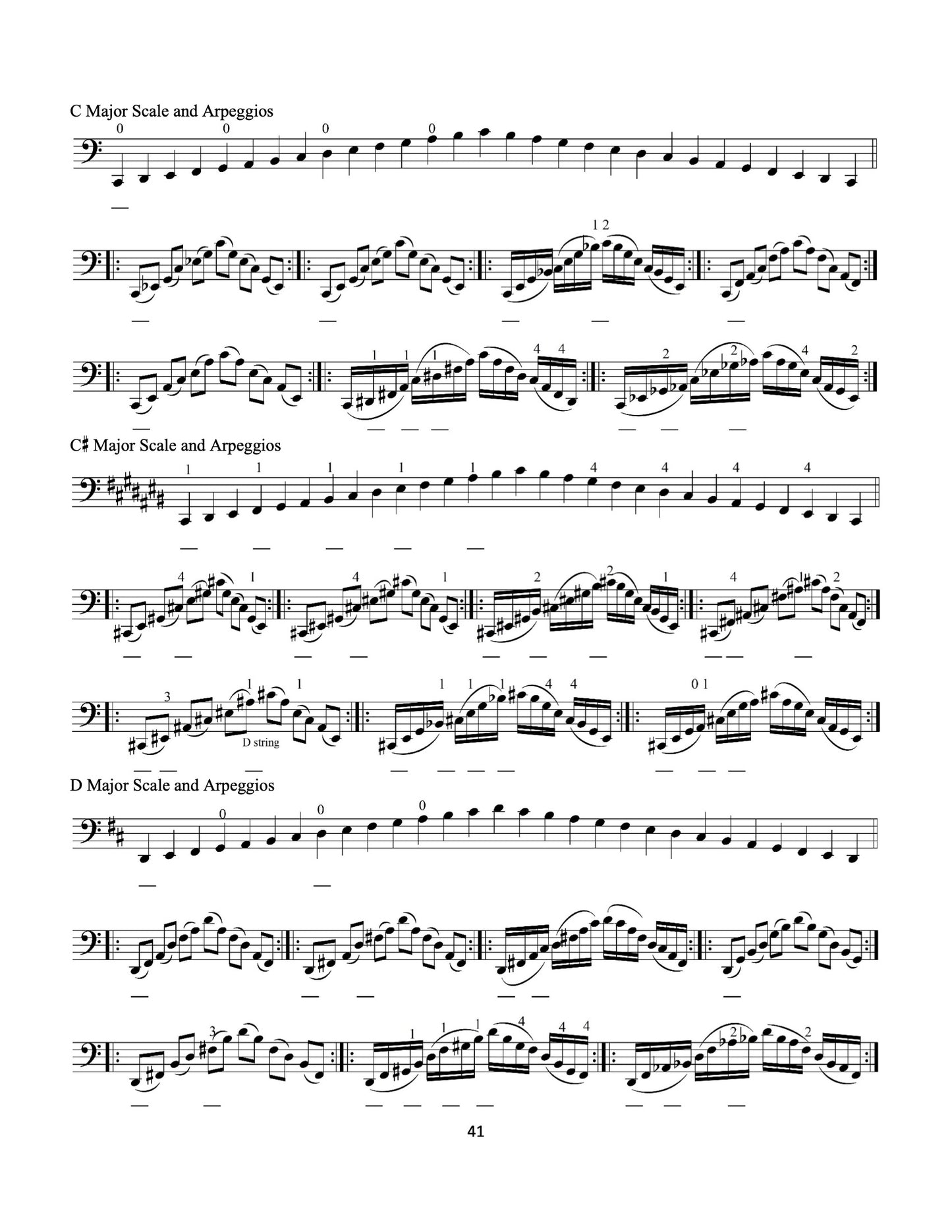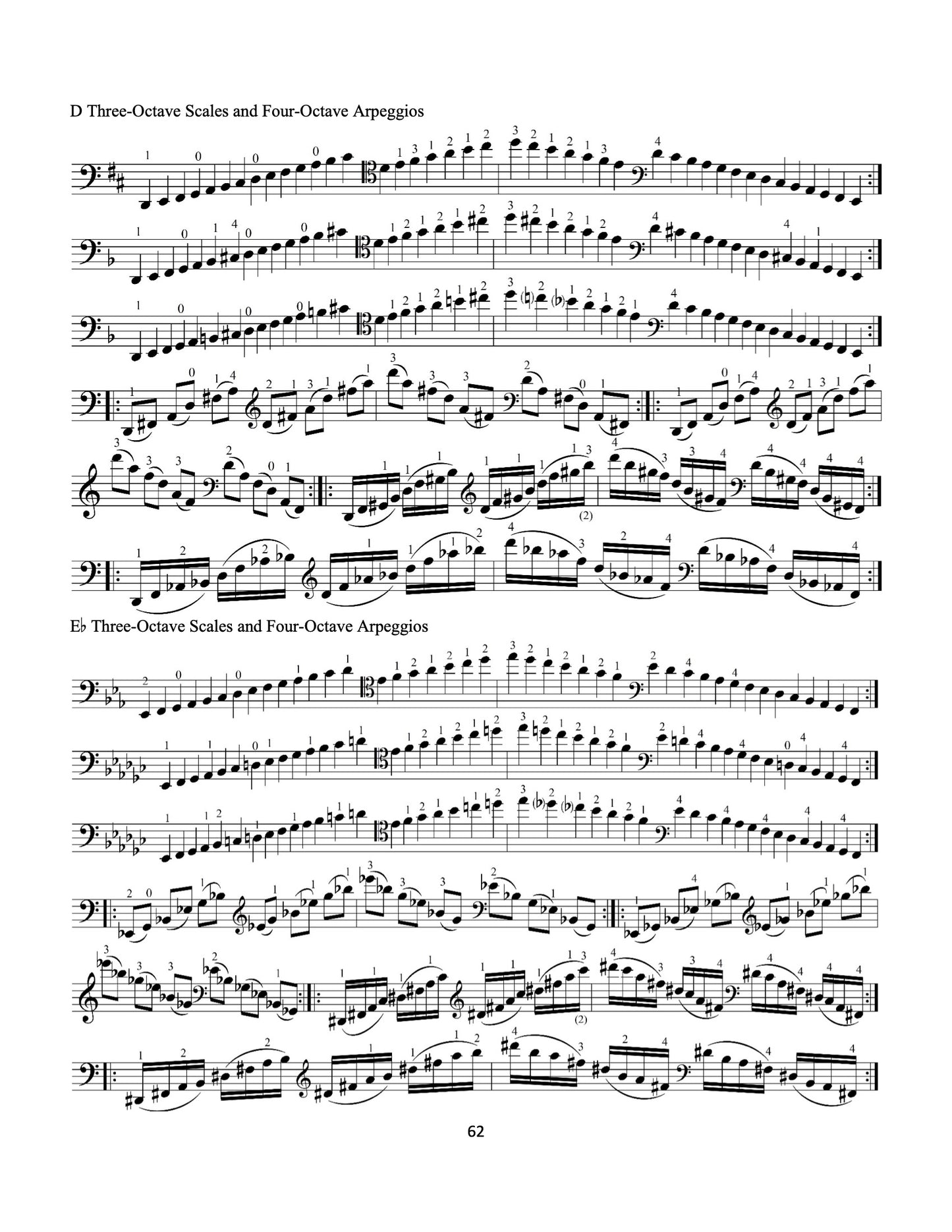CelloBello Store
The Cellist's Guide to Scales and Arpeggios (Digital Edition)
The Cellist's Guide to Scales and Arpeggios (Digital Edition)
Couldn't load pickup availability
by Theodore Buchholz and Robert Jesselson
The Cellist’s Guide to Scales and Arpeggios is intended for cellists of all ages, experience, and ability levels, including teachers, students, amateurs, and professionals.
This book offers a thorough, sequential syllabus of cello scales and arpeggios. The authors start with the most basic one-octave scales and work through a variety of systems, including some of the most complex scales a cellist might ever encounter. There are virtually no other publications that provide a complete and sequential guide for cellists.
Along with the printed and electronic versions of the book, this 140-page sourcebook includes a unique assortment of drones to help with intonation. In addition, there are 41 instructional videos accessible through QR codes. These demonstrate various cello techniques, including ways to tune, extensions, shifting, coordination exercises, velocity studies, and much more.
It’s almost like having two university-level cello teachers with you in your practice room, showing you how to achieve a beautiful tone and precise intonation through scales and arpeggios.
Table of Contents
PART I: INTRODUCTION
Preface: Why Another Scale Book?
The Sequential Plan for Learning and Practicing Scales
How to Use the Drones
PART II: BEGINNING SCALES
Chapter 1 - The First Scales and Arpeggios
The First Scales and Arpeggios: C, G, D, and F
Backward Extension Scales: Bf and Ef Major
Forward Extension Scales: A and D (Lower Octave) Major and D Major (Two Octaves)
PART III: PREPARATION FOR INTERMEDIATE SCALES AND ARPEGGIOS
Chapter 2 - The Right Arm
The Three Principles of Tone Production
Maintaining a Consistent Contact Point
Core Sound
Block of Sound
Relaxation and Good Body Mechanics
Upper Arm/Lower Arm
Elbow Arc
Balance and Left/Right Motion (“Contrary Motion”)
Important Rules for Controlling Sound
Chapter 3 - The Left Arm
Left-Hand Positions
Diagram of Cello Positions
Extensions
The Five-Step Process for Training Extensions
Chapter 4 - Intonation
Helpful Ways to Improve Intonation
Checking Intonation with Open Strings
The Jesselson “Five-Step Process for Playing in Tune”
Three Tuning Systems
PART IV: INTERMEDIATE SCALES
Chapter 5 - Pre-Feuillard Two-Octave Major Scales and Arpeggios
“1, 2, and 4-to-a-Bow” and Off-the-String Bowing Variations
Chapter 6 - Two-Octave Scales and Arpeggios Based on the Feuillard Systems
Chapter 7 - Two-Octave Scales and Arpeggios: The Next Steps
Bow Distribution
Four Basic Bow Distribution Exercises
Frog and Tip Bow Coordination Exercises
Shifting
One-Finger Scales on One String
Over-Extensions
Ghost Shifts
Chapter 8 - The “Mary” System
Chapter 9 - Thumb-Position One-Octave Scales and Arpeggios
Establishing Thumb Position
Interval Spacing Between the Fingers in Thumb Position
Bow Intonation
PART V: ADVANCED SCALES
Chapter 10 - Three-Octave Scales and Four-Octave Arpeggios Based on the Feuillard Systems
Descending New-Finger Shifts
Thumb Placement
Bowing Variations
Chapter 11 - Scales on One String
One-Octave Scales on One String
Two-Octave Scales on One String
Two-Finger Two-Octave Scale on One String
Three-Finger Two-Octave Scale on One String
Two-Octave Arpeggios on One String
Chapter 12 - The “Around and Around” System
Chapter 13 - Universal Fingering System
Two-Octave Major and Minor Scales with the Universal Fingering
Two-Octave Arpeggios with the Universal Fingering
Three-Octave Scales with the Universal Fingering
Three and Four-Octave Arpeggios with the Universal Fingering
Chapter 14 - The Galamian System
Buchholz Variation
Lucktenberg Bowing and Rhythm Variations
Chapter 15 - Velocity Scales
Chapter 16 - The Fourth Octave
Chapter 17 - Chromatic, Whole-Tone, Octatonic, and Quarter-Tone Scales
Chromatic Scales
Whole-Tone Scales
Octatonic Scales
Quarter-Tone Scales
Chapter 18 - Thumb-Position Tetrachord Scales
Thumb-Position Scales Using Tetrachords
Thumb-Position Modal Scales
PART VI: SCALES IN DOUBLE STOPS
Chapter 19 - Introduction to Double-Stop Scales
Just Intonation
Six Double-Stop Bowing Variations
Chapter 20 - Scales in Sixths
One-Octave Major Scales in Sixths
Gordon Epperson’s Fingerings for Two-Octave Major Scales in Sixths
Richard Aaron’s Major and Minor Scales in Sixths with a Universal Fingering
Three-Octave Major Scales in Sixths
Chapter 21 - Scales in Thirds
Chapter 22 - Scales in Octaves
PART VII: OTHER SCALE SYSTEMS
Chapter 23 - Other Scale Systems
Bibliography
Appendix A - Answer Key for the Pre-Feuillard System
Appendix B - Answer Key for the Feuillard Two-Octave System
Appendix C - Instructional Videos
Appendix D - Drones
Acknowledgements
About the Authors
Information
Format: eBook
Skill Level: Multiple Levels
Notation Type: Standard Notation
Pages: 140
Binding: eBook
ISBN: 151347846X
ISBN13: 978-15134-7846-3
Publisher: Mel Bay Publications, Inc.
Date Published: 5/16/2024
Share






